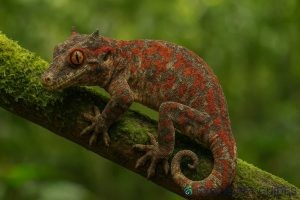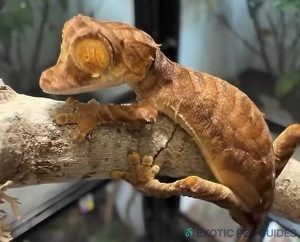If you’re looking for a reptile with a prehistoric look, a calm temperament, and surprisingly simple care needs, the Gargoyle Gecko (Rhacodactylus auriculatus) might be your perfect match. Nicknamed for their “horned” appearance and bony head ridges, these unique geckos are quickly becoming favorites in the reptile pet community.
In this post, we’ll explore everything you need to know about these fascinating creatures—from their origins and behavior to care tips and fun facts.

🌍 Native Habitat and Background
Gargoyle Geckos are native to New Caledonia, a group of islands in the South Pacific. Like their cousins the Crested Gecko and Leachianus Gecko, they are arboreal (tree-dwelling) and nocturnal.
The name “gargoyle” comes from their cranial bumps and ridges, which resemble the stone grotesques on medieval buildings. This, paired with their often mottled coloring, gives them a charmingly ancient look.
📏 Size, Lifespan, and Temperament
- Size: 8–10 inches (including tail)
- Weight: 40–70 grams
- Lifespan: 15–20+ years in captivity
- Temperament: Docile, handleable, and generally easygoing
Unlike some more skittish gecko species, gargoyle geckos are known to tolerate handling well once they feel secure. They may jump or climb, but they rarely bite and quickly become accustomed to their keepers.

🏡 Enclosure Setup
✔️ Housing
- Minimum Tank Size: 20-gallon vertical tank for one adult
- Substrate: Coconut fiber, orchid bark, or paper towels for easy cleaning
- Decor: Branches, cork bark, vines, and plants (real or fake) for climbing
- Lighting: Low-level UVB is optional but beneficial
- Temperature: 72–78°F (22–25°C); avoid temps over 82°F
- Humidity: 50–70%; mist once or twice daily
💡 Tip: Use a hygrometer and thermometer to monitor tank conditions accurately.
🥗 Diet and Feeding
Gargoyle Geckos are omnivorous and thrive on a varied diet.
🍓 Staple Diet
- Commercial Gecko Diets (CGD): Powdered fruit/insect blends (offered 3–4x per week)
- Insects: Crickets, dubia roaches, or mealworms (1–2x per week, gut-loaded and dusted with calcium)
💊 Supplements
- Calcium with D3: 1–2 times per week (if no UVB light is used)
- Multivitamin: Once per week
Provide a shallow dish for food and water, and always remove uneaten live insects.
🧼 Health and Maintenance
🩺 Common Health Issues
| Condition | Symptoms | Prevention |
|---|---|---|
| Metabolic Bone Disease (MBD) | Weak limbs, kinks in spine | Provide calcium + D3 and/or UVB |
| Shedding Problems | Retained skin on toes or tail | Maintain proper humidity |
| Infections | Swelling, discharge, or lethargy | Keep enclosure clean and monitor for changes |
Clean the tank weekly and spot-clean daily. Replace loose substrate every month.

🎨 Morphs and Color Patterns
One of the most exciting parts of owning a gargoyle gecko is their wide variety of morphs. These include:
- Striped (red, orange, or yellow stripes)
- Reticulated (net-like patterns)
- Blotched (irregular patches of color)
- Solid color (less common but striking)
They come in tones of gray, brown, white, red, and orange—often with dramatic contrast and striking eyes.
🤲 Handling Tips
Gargoyle Geckos may take a few weeks to get comfortable with handling.
- Handle them in the evening (when they’re naturally active)
- Start with short sessions (5–10 minutes)
- Let them climb and explore your hands
- Avoid grabbing their tail—they can drop it (though it grows back!)
✅ Daily Care Checklist
- Mist tank 1–2 times daily
- Check temperature and humidity
- Offer food or remove uneaten portions
- Spot-clean waste
- Observe behavior and physical condition
📝 Final Thoughts
The Gargoyle Gecko is a brilliant choice for both beginner and experienced reptile keepers. With their manageable size, striking appearance, and docile nature, they offer the perfect blend of beauty and ease.
Whether you’re a long-time lizard lover or just diving into the world of geckos, the gargoyle gecko is sure to make an unforgettable addition to your reptile family.